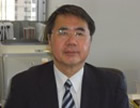From a Year of Turbulence to a Year of Milestones
Dec 19, 2011

Reflecting on the Australia-Japan Business Scene in 2011 and Outlook for 2012
It has been over nine months since I assumed this post last April. Time really does fly. As 2011 comes to a close, looking back from an Australian and Japanese economic perspective, it was truly a year of turbulence; both economies suffered large setbacks. In January, floods ravaged Queensland and caused significant damage to the coal industry. In March, an unprecedented earthquake and tsunami struck the northern part of Japan – supply chains were cut, with many production lines halted due to a shortage of parts. Both economies recovered, but were battered again by the European Debt Crisis in the latter half of the year.
Against this backdrop, the performance of Japanese affiliated companies in Australia reflected the increasing challenge of doing business in Australia’s “two-speed” or “patchwork” economy. According to JETRO’s annual survey of Japanese affiliated companies in Australia conducted from August to mid-September , out of 213 companies surveyed, 35.7% estimated an improvement in their estimated operating profit this year compared to 2010; 28.6% predicted no change; and 35.7% forecasted a lower profit outcome. Compared to the result of the same question in the 2010 survey, companies predicting an improvement decreased by 14.3% while predictions for lower profits increased by 13.9%. These figures mean that more companies estimate a decrease in operating profit this year – we see this as a consequence of the slowdown of the non-resources sector.
In spite of this trend, however, Japanese investors continue to increase their activities in Australia, particularly in the booming resources and energy sector. Our discussions with Japanese trading firms suggest that profits made in Australian resources and energy have contributed greatly to their respective parent companies’ bottom lines. Pushed by a slump in domestic demand and strengthening yen, many Japanese companies made inroads to Australia through M&A activities in such sectors as life insurance, cosmetics, beverages, medical equipment, IT infrastructure building and sales, water treatment, and forestry. Japanese companies continued to expand their business in the residential construction sector as well.
Regarding Australian companies engaged in Japan, the establishment of Jetstar Japan by Qantas and its Japanese partners is a recent example of large-scale investment. There is a very unique case, though, which is little-known but nonetheless worthy of mention – the Gold Coast’s Watermark Hotel. This hotel chain opened the Watermark Hotel Nagasaki in the city’s Huis Ten Bosch area last July. This new hotel is unique in the Japanese market – English is its official language, with all employees such as receptionists, concierges and so on using English with guests by default (of course, Japanese is available too). The Watermark Hotel on the Gold Coast transferred its experienced management staff and chefs to its new establishment in Nagasaki to manage the hotel and restaurant, as well as train local staff.
The Australian economy is now moving towards 2012 with a moderation in growth and concerns surrounding the lingering effects of the European Debt Crisis. Also, with China accounting for over a quarter of Australia’s exports (DFAT 2010 figures), the forecasted cooling of the Chinese economy is another dampener on growth prospects. According to JETRO’s 2011 business survey mentioned above, 47.5% of surveyed companies estimate their operating profit in 2012 will improve; 41.8% estimate no change; and 11.1% predict a worse-off balance sheet. These companies’ views are relatively positive. Generally speaking, Japanese companies’ confidence in the Australian economy is steady, with expectations of continued positive growth in the wider economy, a very rare phenomenon of late among developed countries. This confidence is well-placed in spite of uncertainty on the horizon concerning the effect of the new Carbon Pricing Mechanism and Minerals Resource Rent Tax, both due to be implemented from July 2012.
We expect that Japan’s importance to the Australian economy will continue to grow; Japanese investment, not only in the resources and energy sector (including LNG), but also in other areas, will continue being active for the foreseeable future.
Continuing Free Trade negotiations between Australia and Japan are an important element for 2012’s outlook. Negotiations resumed this December, and will be fully underway in the new year. The Free Trade Agreement between Australia and Korea is said to be very close to conclusion; in order to avoid a situation where Japanese companies are placed at a disadvantage relative to Korean companies in the Australian market, we very much hope for a speedy conclusion to Japan-Australia Free Trade negotiations. In October, we look forward to the annual Japan-Australia Joint Economic Conference in Sydney between the Australia Japan Business Cooperation Committee (AJBCC) and the Japan Australia Business Cooperation Committee (JABCC). With the first Conference held in 1963, 2012 will mark the 50th annual meeting of these two leading organisations. Hopefully, we will hear a positive report on Free Trade negotiations at the Conference. All things considered, 2012 will be a year of milestones for the further deepening of economic relations between Australia and Japan.
And last but not least, I wish you all a Merry Christmas and a happy and safe 2012.





